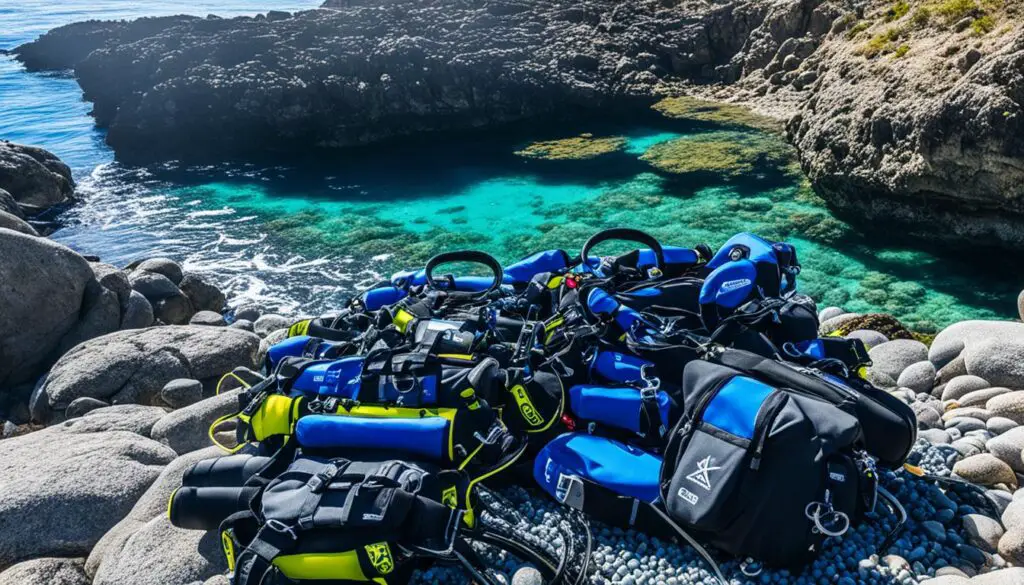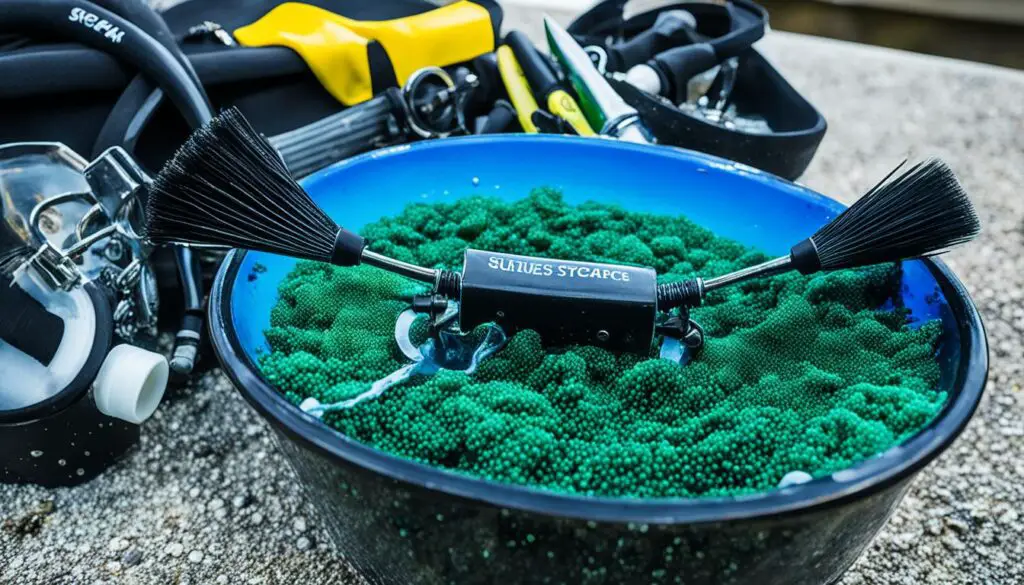Taking care of your diving gear is crucial. It ensures it stays in good shape for years. As someone who loves diving, I know the value of well-maintained gear for unforgettable dives. Besides routine maintenance, there are many ways to extend your equipment’s life. Let’s dive into some essential tips for keeping your gear tip-top and ready for future dives.
Key Takeaways:
- Properly treating your diving gear, especially delicate pieces like regulators and masks, can prevent damage and ensure their longevity.
- Rinsing your gear thoroughly after each dive, both inside and out, helps remove harmful residues and prevents deterioration.
- Storing your equipment in a designated area that is cool, dry, and away from direct sunlight can protect it from unnecessary wear and tear.
- Regular maintenance, servicing, and inspections are crucial to detect any issues early and address them promptly.
- Investing time and effort in diving equipment maintenance will give you the confidence to explore underwater wonders with peace of mind.
Treating Equipment Carefully
When you go scuba diving, looking after your equipment is key. Most gear is tough and can handle the water. However, things like regulators, computers, and masks need extra care. With a little effort, you can make your gear last a long time.
Storing your gear:
Buying special cases or bags for your fragile gear is smart. These protect from hits and bumps. Keep your diving tools in these cases to avoid damage from knocks and scratches.
Securing loose hanging equipment:
Make sure loose items are safe during movement or at rest. This means things like octopuses, gauges, hoses, and compasses. Tools like clips or retractable holders keep them secure. This stops them from swinging, tearing, or damaging other gear.
Proper loading of heavy items:
When you load gear into a vehicle or boat, balance the weight. Lay dive weights, tanks, or camera gear carefully. This stops your equipment from breaking or straining. It’s good for the fragile parts too.
Taking care of your diving equipment helps it last and keeps the delicate items safe. Use protective cases, secure loose gear, and load things properly. These steps will protect your equipment. Remembering to be careful with your gear is important.

Now, let’s talk about the importance of cleaning your gear. After diving, clean your equipment well. This stops it from getting damaged or looking bad. A good cleaning routine keeps your gear ready for the next dive trip.
Cleaning Gear Thoroughly
Cleaning your diving gear well after each dive helps prevent damage. This is true whether you dived in salty or fresh water. It’s key to get rid of all the stuff that might harm your gear.
To clean your gear, simply rinse it with fresh water. You can use a dunk tank, shower, or garden hose. Make sure to rinse every part of your gear. This includes the parts that trap water, move, or are fragile.
Let all the gear dry in a place with good air flow. This stops mold and other problems.
Post-Dive Gear Cleaning Tips
- Rinse Immediately: Rinse diving equipment as soon as possible after each dive to remove salt, sand, or any other potentially corrosive substances. Prompt rinsing helps prevent the accumulation of harmful residue and extends the lifespan of your gear.
- Thorough Inspections: Check your gear well while cleaning it. Look for damage or signs it needs fixing. Fixing small issues early can save you money and prevent accidents.
- Use Mild Cleaners: If your gear is very dirty, use mild soaps made for diving gear. Avoid harsh chemicals since they can ruin the gear.
- Pay Attention to Seals: Regularly check and carefully clean your gear’s O-rings and seals. Lubricate them if needed. These parts are crucial for gear like regulators to work well.
To keep your gear in top shape, follow these post-dive clean-up tips. This will save you money and make sure your diving trips are safe and fun.

Equipment Storage
Storing your scuba equipment right is key to make it last longer. Use good storage methods to keep your dive gear in great condition for your next dive.
Start by finding a spot just for your gear. Pick a place that protects it from dust, moisture, and the sun. A spot that’s cool and dry is perfect for keeping your gear safe and in good condition.
Different gear needs different care. Hang wetsuits to keep them from getting creased and keep their shape. This way, the neoprene won’t get damaged. A well-ventilated spot helps them dry, stopping mold.
Stack your gear carefully if space is tight, with the lighter stuff on top. This keeps fragile gear from getting squished by the heavy stuff. And, don’t forget to use protective cases for items like regulators and masks to keep them safe from harm.
Spending time on proper storage now saves you money on repairs down the line. By storing your gear well, you make it last longer. This protects your investment and gets you ready for your next dive adventure.
Benefits of Proper Equipment Storage
“Proper gear storage not only protects your dive equipment from damage, but it also helps to prevent unnecessary wear and tear. By storing your gear in a cool and dry environment, hanging wetsuits to prevent creasing, and using protective cases, you can significantly extend the longevity of your scuba gear.” – Dive Gear Expert
Summary of Equipment Storage Tips
- Designate a specific storage area that offers protection and is cool, dry, and away from direct sunlight.
- Hang wetsuits on designated hangers to prevent creases and ensure proper drying.
- Stack equipment with delicate items on top when storage space is limited.
- Use protective cases for fragile gear like regulators, computers, and masks.
| Equipment Storage Tips | Benefits |
|---|---|
| Designate a specific storage area | Protection from damage |
| Hang wetsuits on designated hangers | Prevent creases and promote proper drying |
| Stack equipment with delicate items on top | Prevent unnecessary strain and damage |
| Use protective cases | Extra layer of protection against impact and damage |
Conclusion
Taking care of your scuba gear well is key to keeping it in good shape. Do what’s recommended to take care of it, handle it with care, clean it well, and keep it stored correctly. This will help your gear last longer and work better. Don’t forget, regular checks and maintenance are crucial for spotting and fixing problems early.
Putting in the time and effort to care for your gear is a smart move. It means you can enjoy diving without worrying. Follow these tips to get the most out of your gear. This way, you’ll protect your investment and have fun on your dives.
Remember, looking after your diving equipment is about staying safe and getting the most out of your excursions. Take good care of your gear, and it will do the same for you. With proper care, your gear will last longer. This means you’re ready for many exciting dives to come.
FAQ
How often should I clean my diving gear?
It’s best to clean your gear after each dive. This helps prevent discoloration and weakening over time.
How should I clean my diving gear?
Cleaning your gear is easy. Use a freshwater rinse. This can be done with a dunk tank, shower, or garden hose.
Rinse everything well, inside and out. Focus on parts that hold water or move, and anything delicate.
How should I store my diving gear?
Storing your gear right is key. Choose a spot that’s cool, dry, and out of the sun. Always hang wetsuits and stack your stuff carefully.
Use cases for fragile items. This will keep your gear in good shape for longer.
How often should I service my diving equipment?
Get your gear checked often. This ensures any issues are caught early. Talk to experts for the best maintenance advice.
How can I increase the lifespan of my diving gear?
Take care of your gear by cleaning and storing it correctly. Regular check-ups are important too. This will help your equipment last longer.
